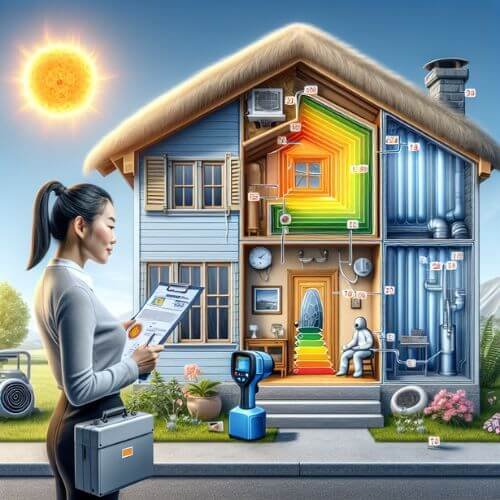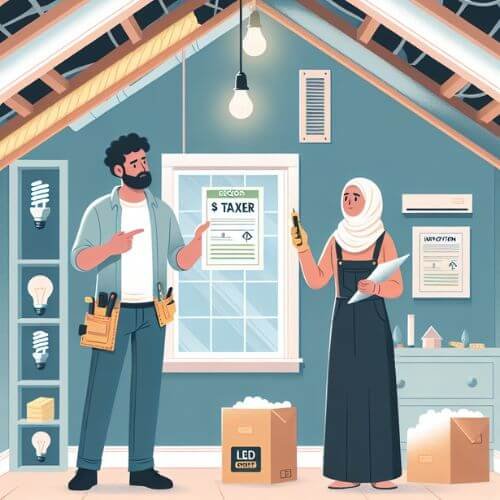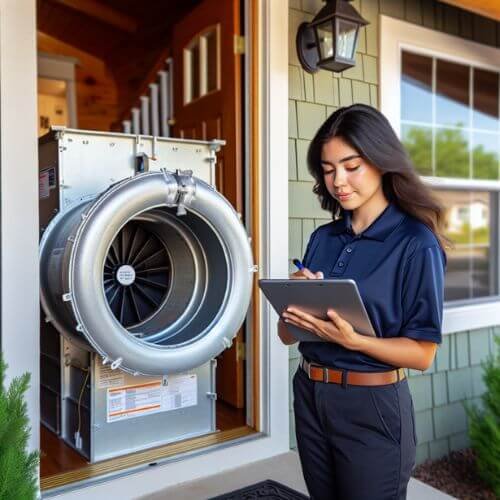Did you know that conducting an energy audit for your home can lead to substantial savings on your utility bills? By identifying areas where energy is being wasted, you can make informed upgrades that enhance energy efficiency, ultimately reducing your costs. The Department of Energy supports homeowners like you in this important endeavor, offering resources and information to ensure your home operates at its best. Engaging in this process not only benefits your wallet but also contributes to a more sustainable environment.

Understanding Energy Audits
What They Are and Why You Need One
As a homeowner, you might be wondering how you can make your home more efficient while also saving money in the long run. One of the most effective avenues to explore is an energy audit.
But what exactly is an energy audit? Simply put, it is a comprehensive assessment of your home’s energy use. It identifies how much energy your home consumes and analyzes what measures you can take to improve its efficiency.
By understanding the energy consumption patterns in your house, you can make informed decisions about upgrades and improvements.
An energy audit evaluates various factors, including insulation, air leaks, heating and cooling systems, and the overall efficiency of your appliances. The findings not only help you pinpoint areas where energy might be wasted but also assist in prioritizing necessary improvements.
So, why should you consider scheduling an energy audit? The benefits are multifold.
First, it reveals opportunities for significant energy savings. These savings ultimately translate into reduced utility bills, giving you more financial freedom.
Secondly, many energy audits can qualify you for financial credits or rebates through local utility companies or government programs. In fact, these incentives may cover the cost of the audit itself.
A comprehensive energy audit can be performed either by a qualified professional or even as a DIY project using online resources.
However, enlisting the help of a certified auditor is often recommended. Professionals are equipped with specialized equipment to detect issues, like infrared cameras that can identify hidden air leaks.
Remember, the clearer the picture you get of your energy use, the better decisions you can make to enhance your home’s efficiency.
The Benefits of an Energy Audit
Conducting an energy audit serves as a critical first step in the journey toward energy efficiency. By identifying problem areas, you not only protect your financial interests but also contribute positively to the environment by reducing your carbon footprint.
Understand that a well-executed energy audit creates a roadmap for improvements—a sort of energy efficiency blueprint for your home.
Furthermore, addressing the issues flagged during your audit can drastically improve your home’s comfort levels.
For instance, sealing drafts and upgrading insulation can lead to more consistent indoor temperatures year-round, making your living space far more enjoyable.
Choosing the Right Auditor
When selecting someone to conduct your energy audit, look for experience, qualifications, and reviews from previous clients.
A reputable auditor will understand the specific requirements of your home and tailor their findings accordingly. They should also explain the audit process, what you can expect, and how the results will lead to potential upgrades for energy efficiency.
The Role of the Department of Energy in Promoting Energy Efficiency
The U.S. Department of Energy (DOE) plays a vital role in promoting energy efficiency among households nationwide.
One of their main objectives is to educate consumers about energy conservation methods, such as the significance of energy audits. The Department of Energy provides a wealth of resources and information that can help you make informed decisions about energy use and enhancement strategies.
From official guidelines on how to conduct an energy audit to insights on energy-efficient products, the DOE serves as a valuable resource for homeowners looking to enhance their energy efficiency.
Their website features information on various programs and initiatives aimed at providing financial assistance for energy upgrades. Understanding what these programs entail can open the door to potential savings that make immediate energy improvements far more affordable.
Moreover, the DOE also facilitates partnerships with utility companies and local agencies to promote energy efficiency initiatives.
Many utilities offer rebates and credits for upgrades that stem from an energy audit, incentivizing homeowners to take immediate action. As a homeowner, your awareness of these incentives can substantially lower your upfront costs, making energy-efficient upgrades more accessible.
Accessing DOE Resources
To get started, visit the official website of the Department of Energy, where you can find interactive tools, resources, and guides on energy audits and effective energy-saving tactics.
You can even locate local service providers who can help with your energy audit or needed upgrades. These resources can significantly assist you in maximizing savings while making educated choices about your home’s energy efficiency.
Collaborative Efforts for Energy Efficiency
The Department of Energy collaborates with various stakeholders, including manufacturers, utilities, and local government entities, to advance home energy efficiency solutions.
Through such collaborations, you can benefit from newer technologies and methods to enhance your home's energy use more effectively.
Knowing your rights, potential savings, and available programs will empower you to make smart decisions regarding energy in your house.
By taking advantage of the various programs and incentives offered through the Department of Energy, you can reduce your costs while contributing to a more sustainable energy landscape.
Through regular audits and improvement updates, you join a larger community committed to reducing energy consumption and improving overall dynamism.
These efforts not only save you money but also pave the way for a greener future—a win-win situation for you and the environment.
Energy audits are an essential tool for understanding your energy needs and making informed decisions about your home's efficiency.
With financial support and educational resources from the Department of Energy, you have all the tools at your fingertips to maximize savings while promoting a sustainable lifestyle.
In the following sections, we will delve into the key steps involved in conducting an effective energy audit and how subsequent energy-efficient upgrades can greatly enhance your savings while improving your home's overall comfort.
Stay with us as we explore these vital areas and offer essential tips for improving energy efficiency in your house.

Key Steps in Conducting an Effective Energy Audit for Your Home
When it comes to making your home more energy efficient, conducting an effective energy audit is crucial. This process not only helps you identify current inefficiencies but also pinpoints areas where improvements can lead to significant savings. Here are the main steps you should follow during your home audit.
Assess Your Energy Usage
To start, take a close look at your energy bills from the past year. This will help you understand your current usage patterns.
Pay attention to how your costs fluctuate from season to season. Higher energy consumption during the summer months for air conditioning or in winter for heating is common, but it’s essential to grasp when peak usage occurs and whether that usage is justified.
Consider using an energy monitoring tool that tracks power consumption in real time. This can help you identify which appliances consume the most resources.
Inspect Key Areas of Your Home
Next, you’ll want to physically walk through your home. Start from the exterior, examining your insulation levels and sealing.
Check all windows and doors for drafts, as leaks can significantly undermine your heating and cooling systems. Proper insulation is essential in maintaining energy efficiency and can reduce the burden on your heating and cooling units.
While inspecting, don't forget about the attic and basement as these areas often hold hidden energy-saving opportunities.
Ensure that there is adequate insulation and that no critical areas are left unsealed. Additionally, look for signs of water leaks, which can not only increase your water bill but also cause structural damage and mold issues.
Evaluate Your Appliances and Systems
Finally, take stock of the appliances and systems that use the most energy. Start with major appliances such as your refrigerator, washer, dryer, and dishwasher.
Check the age and efficiency ratings of these units. Older appliances tend to be less efficient, and replacing them with Energy Star-rated models can yield substantial savings.
Additionally, evaluate your heating and cooling systems. Regular maintenance can keep your HVAC units operating efficiently, but age can also play a role in performance.
If your furnace or air conditioning unit is more than ten years old, consider looking into newer models that meet updated efficiency standards. Look into other energy resources available, such as smart home devices that optimize power consumption.
How Energy Efficient Upgrades Can Maximize Savings
After conducting your energy audit and identifying areas for improvement, you may be wondering how to proceed with upgrades that will maximize your savings.
The answer lies in understanding how each change contributes to your overall energy efficiency and cost reduction.
The Financial Impact of Energy Efficient Upgrades
Investing in energy-efficient upgrades can seem costly initially, but it’s important to view these expenses from a long-term perspective.
By improving insulation, sealing drafts, and upgrading appliances, you will likely see a decrease in your monthly bills.
This gradual reduction in costs accumulates over time. Many homeowners report savings on their energy bills of 20% to 30% after making these enhancements.
Moreover, you may qualify for various financial credits and rebates as part of energy improvement programs.
The United States government, through the Department of Energy, promotes energy efficiency by providing homeowners with resources that can considerably offset the costs of upgrades such as insulation, more efficient windows, and advanced heating and cooling systems.
Types of Upgrades to Consider
Upgrading your home can take many forms, and different improvements may yield varying levels of savings.
Consider the following upgrades:
- Insulation: Adding insulation can pay off dramatically by keeping your home warmer in the winter and cooler in the summer.
- Energy-efficient windows: Replacing old windows with energy-efficient models that include gas fills and low-E coatings helps maintain insulation against temperature fluctuations.
- Programmable thermostat: Installing a programmable thermostat can optimize heating and cooling according to your schedule, further maximizing your savings and improving comfort in your home.
The Importance of Financing Options
When planning for energy-efficient upgrades, do not overlook the financing options available. Various programs offer rebates that can help offset the cost of necessary upgrades.
Be proactive in researching potential tax credits related to energy efficiency improvements; this can greatly enhance your overall savings.
Explore government and local utility programs, as many have specific prerequisites for homeowners.
By investing time to search for available incentives, you may find that financing your upgrades becomes a far less daunting task.
Often, these programs will guide you in selecting qualified improvements tailored for your home, maximizing both comfort and cost savings simultaneously.
In conclusion, improving energy efficiency requires a methodical approach beginning with a thorough energy audit.
This enables homeowners like you to identify actionable steps toward maximizing your home’s efficiency.
By taking the time to assess your energy usage, inspecting key areas, and implementing energy-efficient upgrades, you will start to see the benefits reflected in your monthly bills.
With available financial credits and resources to support your journey, you can enjoy your home while also contributing to a healthier planet.
So take that first step today and start maximizing your savings through energy efficiency improvements!

Essential Tips for Improving Energy Efficiency in Your House
When it comes to enhancing energy efficiency in your home, taking a proactive approach can lead to significant savings on energy bills while also contributing to a more sustainable environment.
There are several practical steps you can take to reduce the energy consumption of your house, making it more comfortable and cost-effective.
Conduct Regular Maintenance on Appliances
One of the key aspects of improving energy efficiency revolves around your appliances.
Regular maintenance can ensure that they operate at peak performance. For example, your refrigerator and washing machine are major energy consumers, and their efficiency can decline over time.
Cleaning coils, replacing filters, and ensuring proper seals can reduce energy waste.
If you have older appliances, consider upgrading to smarter, energy-efficient models.
Look for labels indicating energy savings, and remember that the more efficient the appliance, the more money you save in the long run.
Seal and Insulate Your Home
Ensuring that your home is properly sealed and insulated can dramatically improve its energy efficiency.
Pay close attention to common areas where air leaks may occur, such as windows, doors, and attics.
Using weather stripping and caulking can help prevent drafts, which results in less strain on your heating and cooling systems.
Additionally, upgrading insulation to meet current standards can keep your home comfortable throughout the seasons.
A comprehensive energy audit often includes assessments of insulation and air leakage, providing you with a clearer action plan to enhance your home's efficiency.
Leverage Smart Home Technology
Utilizing smart technology can further maximize your energy efficiency efforts.
Smart thermostats allow you to manage your heating and cooling systems more effectively, adjusting temperatures based on your patterns and preferences.
These devices can result in notable savings on your energy bills.
Furthermore, smart lighting systems can minimize energy usage by utilizing motion detectors and timers, ensuring that lights are only on when needed.
Embracing these technologies can efficiently navigate your energy requirements while promoting comfort in your space.
Exploring Financial Credits and Requirements for Energy Improvement Audits
Another vital aspect of energy efficiency is understanding the financial incentives available to you.
Various programs can provide assistance with the costs associated with energy audits and improvements, making the transition to an energy-efficient home more manageable.
Understanding Tax Credits and Government Assistance
Governments at both federal and local levels often offer tax credits for energy-efficient upgrades.
These incentives can significantly decrease the upfront costs of necessary improvements.
For example, if you decide to install solar panels or upgrade to high-efficiency HVAC equipment, you may qualify for specific tax deductions.
Investigating the eligibility of such credits can help you maximize your savings while adhering to the requirements set forth by energy assistance programs.
Navigating Utility Rebates and Financing Options
In addition to government programs, local utility companies may provide rebates and financing options for energy improvements.
These incentives can include help with specific projects, such as enhancing insulation or upgrading to energy-efficient water heaters.
Before proceeding with energy audits or improvement projects, reach out to your utility provider for information on available rebates.
This will allow you to make informed decisions that align with existing programs, ensuring you receive all possible assistance for your energy-efficient upgrades.
Working with Certified Energy Auditors
Engaging with a certified energy auditor is an essential step in the process of enhancing your home’s energy efficiency.
These professionals are well-versed in the latest technologies and best practices and can provide a comprehensive assessment of your home's energy performance.
They can identify specific areas for improvement and may help you navigate potential funding options for projects.
By obtaining a detailed report from an energy auditor, you gain valuable insights that can steer your energy efficiency efforts and amplify your savings on energy bills.
Key Steps for Improving Energy Efficiency
Here are some key steps to consider for improving energy efficiency in your home:
- Conduct regular maintenance on appliances.
- Seal and insulate your home to prevent air leaks.
- Utilize smart home technology like thermostats and lighting.
- Explore financial credits available for energy-efficient upgrades.
- Reach out to utility companies for rebates.
- Engage with certified energy auditors for a thorough assessment.
In conclusion, undertaking energy-efficient improvements in your home is not merely a way to save money; it’s a significant investment in your comfort and sustainability.
By taking advantage of financial incentives and making well-informed upgrades, you can not only improve your home's energy performance but also enjoy the many benefits that come from being a more responsible consumer.
Engage in conversations with professionals, stay informed about the latest upgrades, and embrace the many programs designed to streamline your transition to an energy-efficient home.
Your future self will thank you for it.

